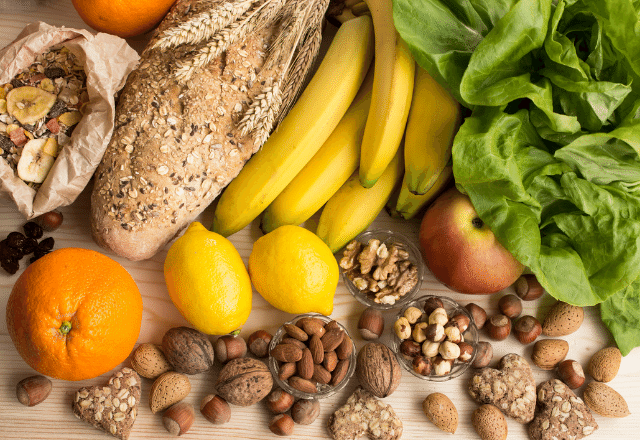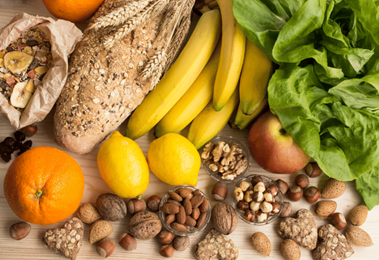Digestive Enzymes and Digestive Enzyme Supplements
Featured Expert:
Digestive enzyme supplements have gained popularity for their claims of treating common forms of gut irritation, heartburn and other ailments. But how do digestive enzymes work, and who really needs to add them to their diet? Morgan Denhard, a registered dietitian at Johns Hopkins Medicine, provides the answers you need.
What are digestive enzymes, and what do they do?
Naturally occurring digestive enzymes are proteins that your body makes to break down food and aid digestion. Digestion is the process of using the nutrients found in food to give your body energy, help it grow and perform vital functions.
“When you eat a meal or a snack, digestion begins in the mouth,” explains Denhard. “Our saliva starts breaking down food right away into a form that can be absorbed by the body. There are a lot of different points in the digestive process where enzymes are released and activated.”
Your stomach, small intestine and pancreas all make digestive enzymes. The pancreas is really the enzyme “powerhouse” of digestion. It produces the most important digestive enzymes, which are those that break down carbohydrates, proteins and fats.
Types of Digestive Enzymes
There are many digestive enzymes. The main digestive enzymes made in the pancreas include:
- Amylase (made in the mouth and pancreas; breaks down complex carbohydrates)
- Lipase (made in the pancreas; breaks down fats)
- Protease (made in the pancreas; breaks down proteins)
Some other common enzymes are made in the small intestine, including:
- Lactase (breaks down lactose)
- Sucrase (breaks down sucrose)
What is digestive enzyme insufficiency?
Some people don’t have enough digestive enzymes, or their bodies don’t release the enzymes as they should. This means they can’t break down certain foods and absorb nutrients.
A few types of digestive enzyme insufficiency include:
- Congenital sucrase-isomaltase deficiency: You don’t have enough sucrase to digest certain sugars.
- Exocrine pancreatic insufficiency: EPI occurs when your pancreas doesn’t produce enough of the enzymes necessary to digest carbohydrates, proteins and fats.
- Lactose intolerance: Your body doesn’t produce enough lactase, so you might have problems digesting the sugar naturally found in milk and dairy products.
Symptoms of Digestive Enzyme Insufficiency
Digestive enzyme insufficiency can lead to malnutrition or gastrointestinal irritation. Common symptoms include:
- Belly pain or cramps
- Bloating
- Diarrhea
- Gas
- Oily stools (bowel movements)
- Unexplained weight loss
Talk to your doctor if these symptoms are persisting. These could be signs of gut irritation or could indicate a more serious condition.
Digestive Enzymes vs. Probiotics: What’s the difference?
Sometimes people confuse enzymes and probiotics. Both affect your digestion, but in very different ways. Probiotics are live organisms that make up the good bacteria in your gut. They help keep your digestive tract healthy, so they support the work your enzymes do. Unlike enzymes, probiotics do not have the ability to break down or digest food components.
Without good gut bacteria, you might experience symptoms similar to those of an enzyme insufficiency, such as bloating or gas, due to abnormal bacterial overgrowth or imbalance in your intestines.
What conditions can cause digestive enzyme insufficiency?
Some enzyme insufficiencies are genetic, which means they’re the result of an abnormal gene. Such a gene might be inherited from a parent, or a mutation can occur without a known cause. Enzyme insufficiencies can be congenital (present at birth) or develop over time.
Some disorders or medical treatments can lead to pancreatic enzyme insufficiency:
- Chronic pancreatitis
- Cystic fibrosis
- Gastrointestinal surgeries
- Pancreatic cancer
- Any condition that disrupts your pancreas
Are there external sources of digestive enzymes?
Prescription digestive enzymes
People diagnosed with an enzyme insufficiency often need to take prescription digestive enzymes. These supplements help the body process food and absorb nutrients better. The most common and the only FDA-regulated enzyme replacement therapy is pancreatic enzyme replacement therapy (PERT). PERT is a medication your doctor prescribes that includes amylase, lipase and protease. It helps break down carbs, fats and proteins.
“About 90% of my patients with cystic fibrosis have pancreatic enzyme insufficiency. Many of them need PERT because their pancreas develops mucus and, over time, scar tissue. So it can’t release the enzymes as it should,” explains Denhard. “We also prescribe enzymes for patients with frequent pancreatitis. There’s ongoing research about the role of digestive enzymes in treating irritable bowel syndrome, but so far there’s no definitive evidence to suggest that enzymes can help with this condition.”
Over-the-counter digestive enzymes
Many people take over-the-counter digestive enzyme supplements for problems such as acid reflux, gas, bloating and diarrhea. These might contain amylase, lipase and protease. Some contain lactase and alpha-galactosidase (an enzyme the body doesn’t make, even in healthy people without enzyme insufficiency). Alpha-galactosidase can help break down a type of non-absorbable fiber called galactooligosaccharides (GOS), mostly found in beans, root vegetables and some dairy products. GOS is known to be beneficial, but it can cause gas and bloating in some individuals.
Denhard says it’s important to keep in mind that these over-the-counter digestive enzyme supplements aren’t regulated by the FDA. So the dosage, ingredients and enzyme concentration aren’t guaranteed, and their side effects are unknown. Some supplements make claims that aren’t supported by evidence, such as enzymes to promote weight loss or a flatter stomach.
“Overall, a healthy person really doesn’t need to take digestive enzyme supplements,” Denhard explains. “The best digestive enzymes are the ones our bodies make naturally, and they work best when you eat a whole food diet.”
Can I get digestive enzymes from the food I eat?
There’s no real evidence to suggest that enzyme-rich foods such as pineapples and avocados help your digestion. You’re better off building a well-balanced diet that contains fresh fruits and vegetables, lean proteins and whole grains. These foods will naturally help support the work your digestive enzymes are already doing.
Denhard suggests cutting highly processed, fatty foods from your diet, especially fried foods. “It’s much more likely that someone will have GI irritation or other problems because of unhealthy foods, not an enzyme insufficiency,” she says.







